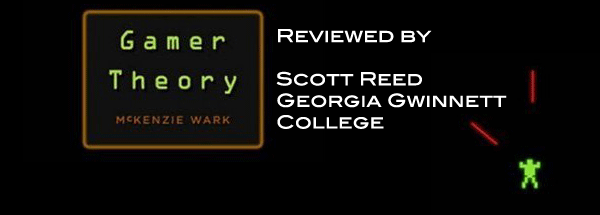
What does it mean to do gamer theory?
Wark's book is, if nothing else, a manifesto: less about a particular way of reading games than a “strategy guide” for a critical project. While each chapter develops part of a massive theoretical framework embracing critical theory, history, media theory, and sociology, each chapter is also simultaneously a performance of the very theory Wark is building. In those performances, readers can catch a glimpse not only of what it means to “do gamer theory,” but to also catch a sense of the kind of writing subject Wark calls on to do that kind of work. Who, ultimately, is going to play this game?
Wark partially establishes the shape of gamer theory (and of gamer theorists) by contrast. One of his more notable targets, at least for the sake of my discussion, is critical theory itself. Referred to at one point as “hypocritical theory,” Gamer Theory strikes a pose of insouciant cynicism towards the hegemony of academic discourse and its often apparent impotence when it comes to solving the problems it claims to address. In perhaps his most inflammatory turn of phrase, Wark refers to critical theory as mere “hypocritical theory” – “indistinguishable from porn” it more resembles a sport (with star players and codified rules and positions) than an intellectual pursuit (151). Conversely, Wark reserves significant praise for the works of Martin Heidegger, who in contrast to (hypo)critical theorists, wrote “a strategy guide for Theory as a game of being” (160). Gamer Theory accordingly plays less toward the topographical formations of schooling and more towards trying “to describe what being now is” (150).
On a more general level, Wark's cynicism toward academic literacy can be read more generally as a cynicism regarding education itself. The initial salvo is fired early, with Gamer Theory's first chapter targeting not just the metaphor of The Cave, but by extension the prominence of that metaphor's founder. Plato's Cave, after all, offers not only a picture of Plato's metaphysics (the separation of the subject from true “reality”), but also suggests the beginnings of a solution: philosophical discourse as an inquiry into the true forms of things. Gamer Theory, instead, is a far more quintessentially postmodern sort of project, one based on a deep-seated “incredulity” towards those “metanarratives” (Lyotard 1984, p. xxiv).
Instead, “Gamer Theory starts with a suspension of the assumptions of The Cave: that there is a more real world beyond it, somewhere, and that someone – some priest or professor – knows where it is” (19). To “do gamer theory,” then, means slipping the bounds of the teacher/student dynamic, of the institutionality in which most of us work. As Wark playfully puts it later on: “Too much dungeon [referring both to John Nash's prisoners dilemma and Foucault's Discipline and Punish], not enough Dungeons & Dragons” (125). Gamer Theory's project – to point the way “to what being now is” – can, I think, partially coincide with spaces of institutional learning, but its real force is generated from without, and any attempt to fully contain it within schooling is doomed to fall flat. School is just another Cave that gamer theorists can find their way into and game their way out of.
Gamer Theory's preference, however problematically rendered given its own reliance on the very theory it seems to dismiss, is to build a new subject position generated from outside schooling, from the scenes of “everyday” gameplay. The starting ground for understanding the world (and working to remedy its very real problems) is to acknowledge and engage the games/Caves of lived experience first. Perhaps in that sense, Gamer Theory aligns itself with principles of learning transfer that are increasingly an important dimension of composition studies, particularly with regards to how writing pedagogies can encourage learning across disciplinary fields. Kathleen Yancey (2009) writes that electronic portfolio pedagogy, for instance, encourages a union of sorts between not just the “delivered” curriculum, but the way that curriculum is subjectively “experienced” and “lived” (pp. 2-3). Wark's more profound gesture, despite its rhetorical baggage, has less to do with the cynical dismissal of schooling or critical theory and more to do with framing those (disciplined, sanctioned) pursuits as being no more or less Cave-like than the games we engage at home.
The inherent violence of gaming, though, figures an interesting barrier to doing gamer theory productively. By “violence,” I mean not only to bring into view the violent content of many games , but also the larger epistemological violence of the digital itself. Much of Wark's exigence in developing Gamer Theory in the first place is the way that games represent the (technological, cultural, epistemological, rhetorical) hegemony of the yes/no, one/two logic of the digital; games are “the digital itself [made] into entertainment” (96). Being themselves constructed not just out of digital media, but out of systems of rules, games double-down on that violence, and it's because of that interpretation that Wark can suggest using games creatively (allegorically) to critique gamespace itself.
Those creative constructions are where the gamer theorist has the most elbow room to “write.” Writing gamer theory is, then, a process of engaging games (digital games, but also the epistemological/critical games of schooling itself) in an effort to augment academic discourse in a way that responds critically and creatively to the “violence” that shapes us as subjects and writers. Indeed, as Wark quotes Guy Debord: “no vital eras were ever engendered by a theory; they began with a game or conflict or a journey.” To which Wark adds: “And perhaps now by a conflict within and against the game, and a journey through it to get beyond it” (224). In a turn of phrase reminiscent of the pop-culture engaged postmodern pedagogies of Geoffrey Sirc, Anne Francis Wysocki, and Gregory Ulmer, Wark frames the “journey through” gamespace – and by extension the “vital era” of intellectual work to follow – in contradistinction to the “serious work” of academic discourse:
If [economic] game theory is objective, rational, abstract, then gamer theory is subjective, intuitive, particular. (124)
The latter “territory” (which I had better call a topology instead) challenges and frustrates many of the most closely held goals and traditions of academic writing, or at the very minimum frustrates the institutional pressure to teach the norms of academic discourse effectively, and readers resistant to the notion of challenging those goals and traditions may find Wark's own idiosyncratic performance off-putting. That same performance, though, opens up Gamer Theory as not just a compelling theory about games and their situation in our mediated culture, but also as an interface for generating playful-yet-thoughtful approaches to gaming that blur the lines between formal and informal writing.







